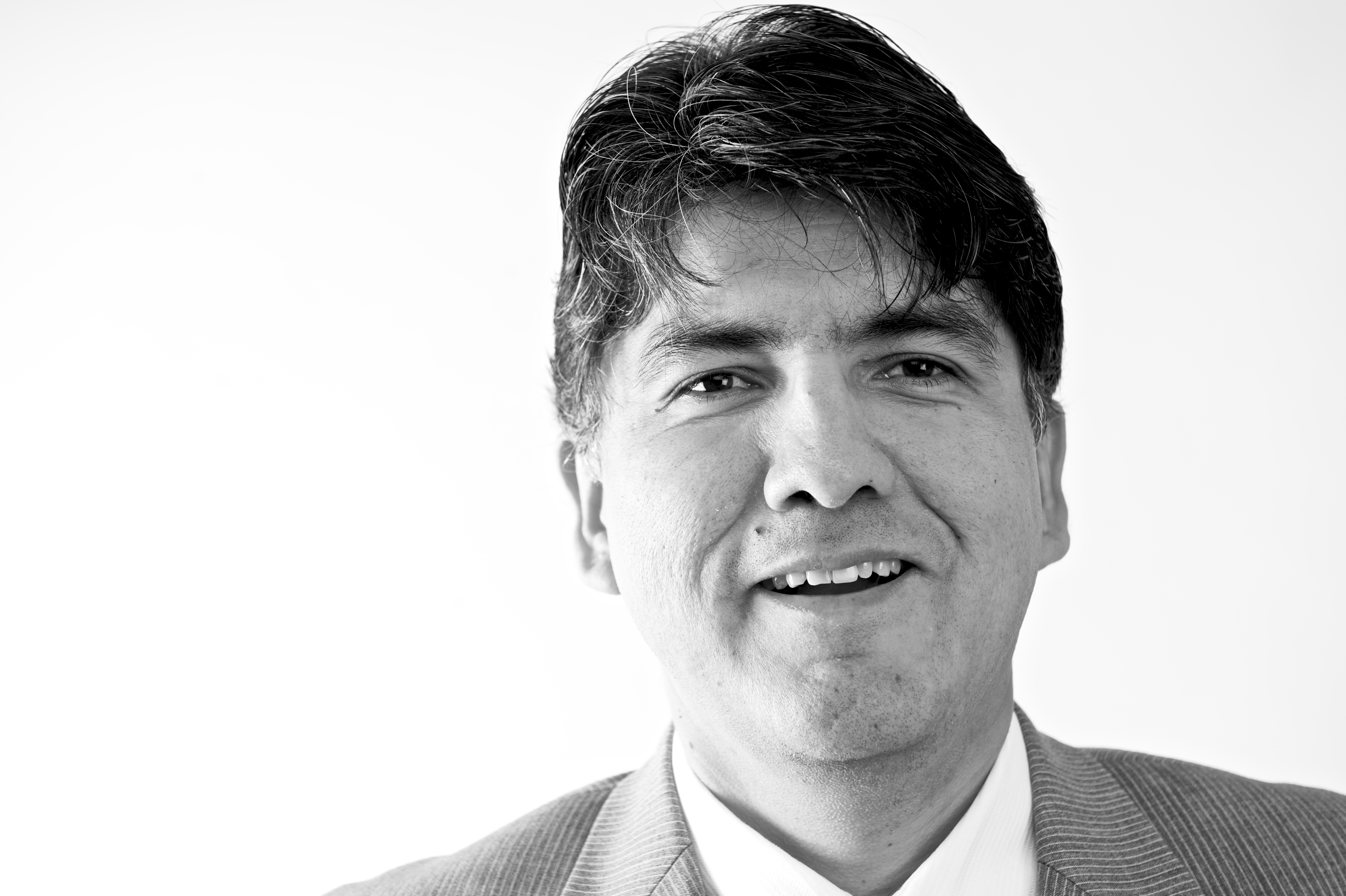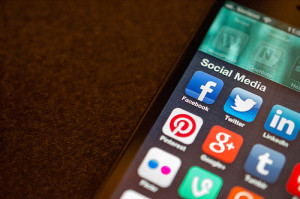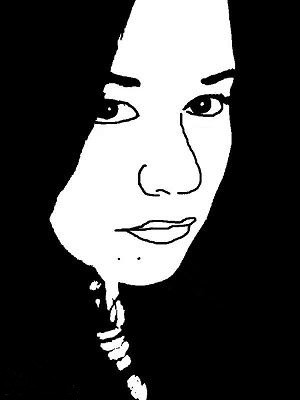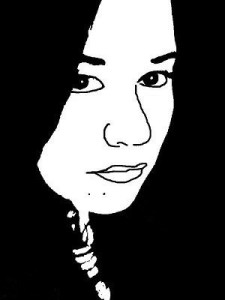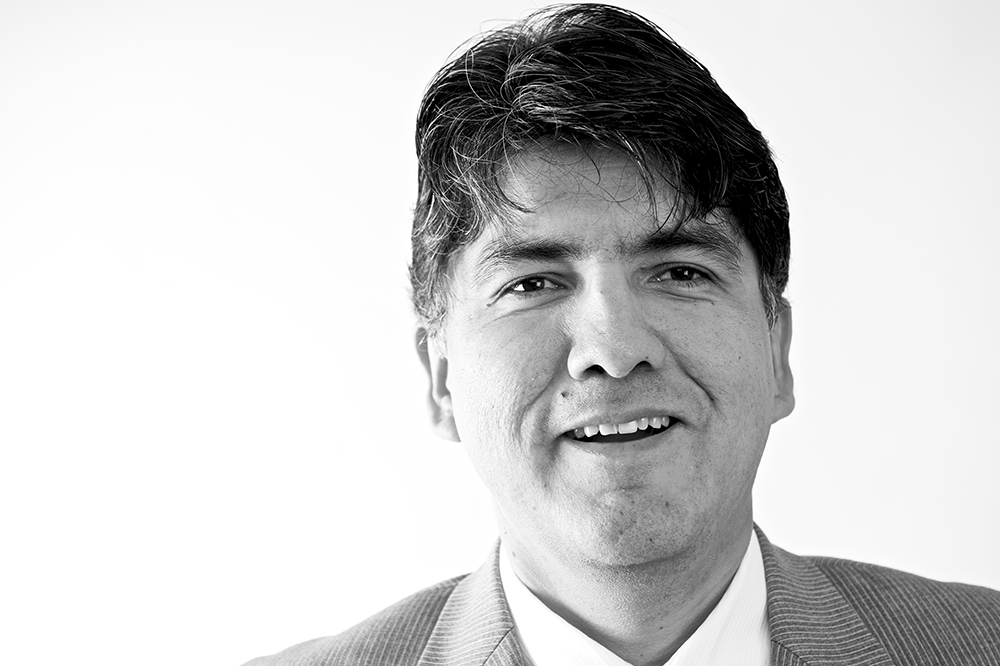
When his first book, The Business of Fancydancing, came out two decades ago, the New York Times Book Review hailed Sherman Alexie as “one of the major lyric voices of our time.” Since his debut, the American Indian novelist, poet, and filmmaker has written two dozen books and won the PEN/Faulkner Award for Fiction. A Spokane/Coeur d’Alene Indian, Alexie grew up on the Spokane Indian Reservation in Washington State — an experience that became the basis of his semi-autobiographical novel for young adults, The Absolutely True Diary of a Part-Time Indian
, which won the National Book Award for Young People’s Literature. Alexie has also delved into film, writing the critically praised screenplay for Smoke Signals
. His latest work is What I’ve Stolen, What I’ve Earned
, a collection of poems and short prose published last November by Hanging Loose Press.
Sherman Alexie spoke to In The Fray about what it’s like being an “ambiguously ethnic person,” how the first immigrant he met inspired him, and why writing groups make him flinch.
You’re often asked about growing up on a reservation. I recall reading your short story, “Indian Education,” for the first time and being blown away by it. How did your experiences growing up shape what you write about?
Oh, that early stuff is barely fiction. Yeah, “Indian Education” … I called it fiction to give myself those moments where I could actually tell a more interesting version of what happened. I mean, there’s no doubt. I remember reading my first book after many years and laughing because I could have easily called it autobiography. So certainly early on, that’s what I was doing, as many young writers do.
One of the things I’ve been realizing lately — and having the words for it, I guess — is that I generally write about unhappiness and poverty and oppression, and all that difficult stuff, growing up on the res. But what I’ve realized is that a lot of my unhappiness has to do with the fact that I was a natural liberal. And an Indian reservation is an essentially conservative place. So, yeah, I was really fleeing conservatism of the Indian variety.
I can kind of relate to that. I come from a Korean American background, which can be conservative in many ways.
It’s fascinating because — I don’t know about your family — but because Democrats are usually the ones who are more pro-Indian, the worldview of Indians tends to be more Democratic. But at the same time, their tribalism is incredibly right-wing. The religious stuff is incredibly right-wing.
What did you surround yourself with, then, when you were on the reservation?
Books, books, books, books. And what I didn’t know then, and I certainly didn’t have the vocabulary or experience to know, is that I was really reading the work of about a dozen generations of white American liberals.
What were you reading?
Jane Austen, who is not actually American. [laughs] You know, The Great Gatsby. I should say, not white American liberals. White liberals. Shakespeare, Dickens, Whitman. Stephen King. Even travel books, encyclopedias.
Do you visit the reservation often?
Not since my dad died. He died ten years ago, and I have a hard time being home. I mean, my mom and my siblings still live there, but I meet them in Spokane. I have a lot of pain associated with the reservation. I am completely public and out about the fact that Indians should be fleeing reservations. We’ve completely forgotten that reservations were created by the United States government as an act of war. I think they still serve that purpose. It’s Stockholm syndrome.
You have said that leaving the reservation was a pivotal moment in your life. In an interview with Bill Moyers you said that you felt like an “indigenous immigrant” and a “spy in the house of ethnicity.” I love that. Can you tell me what you mean by that?
Everybody thinks I’m half of what they are. I get treated in every way imaginable, from positive to negative. People will say things to me and react to me in every way possible.
Like the question of “What are you?”
What are you? Where do you come from originally? [laughs]
What do people think you are?
Asian, Central American, South American, Puerto Rican, Italian, Cuban, Middle Eastern, Pakistani, Siberian, Russian, Slavic. It used to really bug me. It used to really anger me to not be seen as Indian. I realized that came out of this sort of insecurity — my identity was so based on immediately being perceived as being Indian. But the thing is, in order to immediately be perceived as Indian, you have to talk, act [“Indian”]. You have to wear all these cloaks. You have to conduct yourself on such a surface “Indianness” level that you become a cartoon character.
Did you feel that way when you first went off to college and left the reservation?
I felt like a minority. I mean in eastern Washington, I am completely identifiable as Indian. I guess the question as an ambiguously ethnic person is, how to protect yourself. You know, you’re driving into a region and you think, “Okay, how likely am I to be confused for a member of the race that’s most hated in this region?” I think it’s the shit that white people don’t even consider. Often they don’t even think that it’s real. And it’s often the thing that makes brown people so enraged and irrational, too. So it has this double effect, you know — white people deny it, and brown people base their entire lives on it. It’s so damaging in all sorts of ways …
Also, there’s a certain kind of magic in [race]. It’s often about people trying to connect. It’s like that brown-people head nod in the airport — when you see somebody, you make eye contact with somebody who is something, and you’re something, and you may be the same something, so you do that little head nod at each other. Like, “Yeah, I acknowledge the fact that we may be of the same brown-skinned race, or maybe not, but I’m gonna nod my head just in case.”
A lot of your work is about despair, but I feel you never get a sense that your writing is didactic. You talk about these subject matters but kind of interspersed with moments of real comedy and hilarity. What is that like for you as you’re writing?
I don’t worry about it. I don’t preplan or preconsider whether something is going to feel didactic or not. And I think I have been didactic, and I’m perfectly fine with that. I have a specifically political and social ambition in my work. I’m happy when anybody reads my book, but I especially love that my career has become multigenerational, and really happy that all sorts of brown boys are into my books now. I get “This is the first book I finished” or “This is the first book I ever loved.” I hope I am the gateway book.
I don’t think there’s a typical writing process for you, is there?
Oh God, no.
Do you have any rituals or habits?
Nothing. I think ritual prevents you from writing. If you don’t have everything in place, I think that ends up being an excuse. The more complicated your writing ritual the more likely you are not to write. So no, I am promiscuous.
How about deciding between poetry and prose? Do you ever start out with a poem and later decide that it would be much better as a short story — or the other way around?
It used to be more clear-cut that way. It really came down to the mechanics of the thing I used [to write]. I started out writing on a typewriter. If the poem went past one page, it turned into a story. When I pulled that sheet out of the typewriter, it really made the distinction between poetry and prose clear to me. But now that you don’t do that, you keep writing. I think it’s far more blurred and unpredictable.
Do you read your work aloud?
Oh, constantly. All the time. I am not a formalist, a typical formalist, but I use a lot of rhyme — all of traditional forms — and repetition. So certainly the music of it is something I am very interested in.
Do you have readers or friends you show your work to?
Most of my work, I don’t. I have a few friends that see my early stuff, but by in large, no. I am pretty isolated that way. I don’t hang around, you know, a writing group. That makes me flinch. Or hanging around writers talking about writing. That makes me flinch. If I were a plumber, I wouldn’t want to be talking about plumbing all night. My friendships revolve around my other interests.
This is a broad question, but who would you say has been a big influence on your life and work?
Always teachers. And not even necessarily English or writing teachers. One of the reasons why I’m good at public speaking is my experience with the Future Farmers of America in high school. I did debate. I did parliamentary-procedure contests and debate within Future Farmers of America. It was performance. You would get a randomly chosen topic and a specific set of motions that you had to display. It was sort of theater, in a way. And you would be debating and discussing these issues as well at a mock meeting — bureaucratic theater, essentially. I’ve always been in the school plays, too. On the res, I was always the narrator and the lead role.
When you went to college that’s when you got into poetry. And you credit one of your professors at Washington State University.
Yeah, Alex Kuo. He’s a poet. He’s incredibly brilliant and extremely liberal and politically minded. He was born in China and grew up in the US, in Boston. It was my first experience — I haven’t ever put it this way before — it was my first experience with an immigrant. I’m just realizing that.
What was that like?
Well, he was the first Chinese person I knew. The first Chinese American I knew, the first poet I knew. He was this perfect combination of all those liberal things I was reading about on the res, in the form of a second-generation Chinese American.
The first class [of Kuo’s course] he assigned the work, and a week later we met. Before the second class he read five pages of my poems, and they were the first five poems I had ever wrote. He came in and he took me in the hallway. He asked me what I was doing with the rest of my life, and I said, I don’t know. And he goes, “Well, you should be a writer.”
Are there any topics or themes that you don’t want to face, or stay away from?
I stay away from specific tribal and religious ceremonies. I have characters who participate in that stuff, but I never go inside the sweat lodge, so to speak. I think it would be playing a character. And number two, Native religion is so economically exploited that I have no interest in being a part of that, either. And it’s a cliché by now, Native spirituality. It’s all that. And it’s just bad writing.
When did you start Tweeting?
Maybe it’s been a year and a half. It’s entertaining. It’s a monologue. It’s so funny. Some people get so mad that I don’t have conversations with them. They get all Twitter fundamentalist: “There are these rules!” It’s another forum for me to put ideas that people can agree with or not, but I have no illusions about whether I am going to change anybody’s mind about anything.
I saw that your book The Absolutely True Diary of a Part-Time Indian was banned recently in a school in West Virginia. Do these actions ever surprise you or piss you off?
I support all the people who fight these bans, but on the individual level, all they do is benefit me. It’s a lot of free publicity. The philosophy, you know, is dangerous. The people who try to ban one book, they’re not trying to ban a book. They’re trying to ban imagination.
When do you know that you’re absolutely done with pieces of your work?
When my publisher tells me that they have to have to be turned in. It’s really deadlines. I abandon things. I turn them in because I have to.
Is there anything else that you want to accomplish still as a writer?
Hopefully to get better. I want to write a book that surprises me. And in doing so, surprises everybody else. Something I never thought I was going to write about, or was capable of doing. I don’t even know what that is. Then it wouldn’t be a surprise.
This interview has been condensed and edited.
Susan M. Lee Susan M. Lee, previously In The Fray's culture editor, is a freelance researcher and writer based in Brooklyn. She also facilitates interviews for StoryCorps, a national oral history project. In her spare time, she maintains the blog Field Notes and Observations.
- Follow us on Twitter: @inthefray
- Comment on stories or like us on Facebook
- Subscribe to our free email newsletter
- Send us your writing, photography, or artwork
- Republish our Creative Commons-licensed content

